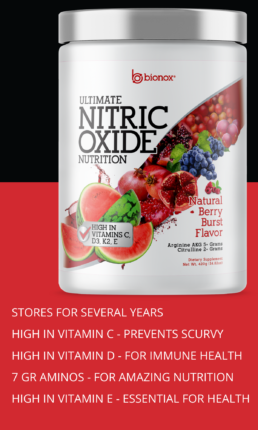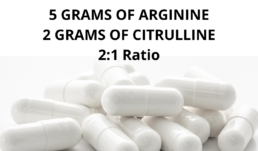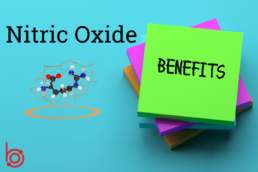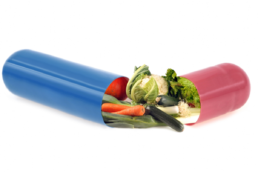Heart Healthy Emergency Meal Prep: Preserving Nitrate Counts and Ensuring Longevity
Heart Healthy Emergency Meal Prep?
In an unpredictable and unstable world, emergency preparedness becomes a central concern for many and a very prudent endeavor to invest in. In case of an emergency, we may scramble to ensure safety and care for immediate necessities, while nutrition would take a backseat. Considering that heart disease remains a leading cause of mortality, it’s critical to focus on heart health even during emergencies, especially if they turn out to be longer term than we imagined.
Thus, understanding heart healthy emergency meal prep and the nuances of preserving nitrate counts in foods becomes essential. This guide, backed by Bionox’s expertise and its product, Ultimate Nitric Oxide Nutrition, seeks to illuminate this path.

The Heart-Health Connection
A heart-healthy diet revolves around consuming foods rich in nitrates and antioxidants, which promote cardiovascular function and overall wellness. Nitric oxide, a compound our body produces with help from nitrates, plays a pivotal role in regulating blood pressure and enhancing blood flow, which is crucial for optimal heart health.
Understanding the Role of Nitrates in Heart Health: What are Nitrates Anyway?
Nitrates are compounds found naturally in certain vegetables like beetroot, arugula, and a few others and are converted into nitric oxide in the body via bacteria found in your mouth. Nitric oxide plays a crucial role in maintaining vascular, arterial, and heart health, as it helps to dilate blood vessels, improve blood flow, and reduce blood pressure, to name just a few benefits of this amazing compound. A diet rich in nitrates can, therefore, contribute significantly to improving cardiovascular health. Interesting and of note for this discussion, nitrates are sensitive to heat and can be depleted during cooking or prolonged storage. This makes it challenging to preserve their heart-healthy benefits, especially in emergency situations where access to fresh produce may be limited.
What can extend the life of nitrates in vegetables like Beets?
Adding vitamin C (ascorbic acid) can help preserve the nitrate content in vegetables like beets when they are stored for longer periods of time. Vitamin C plays a major role in preventing the conversion of nitrates to nitrites, which is especially important if you’re aiming to consume these vegetables for their nitrate content for potential health benefits, such as supporting heart health.
When nitrates turn into nitrites in the presence of certain enzymes and bacteria, you lose the potential cardiovascular benefits associated with nitrates. Nitrites, on their own, are not harmful and can even convert back to nitric oxide in the body under certain conditions. However, in the presence of proteins (like in some processed meats), nitrites can form nitrosamines, some of which have been implicated as potential carcinogens. Thus, there’s often a concern about nitrite levels in foods.
By adding vitamin C to preserved veggies, you are not only preserving the nitrate content but also reducing the potential for nitrosamine formation if those vegetables are consumed with protein sources. This is one reason why vitamin C (or erythorbic acid, a derivative of ascorbic acid) is often added to cured meats—it acts as a nitrosamine inhibitor.
Bionox and Ultimate Nitric Oxide Nutrition: A Lifeline for Your Heart
In times of crisis, having a reliable and effective supplement can make all the difference. Bionox’s Ultimate Nitric Oxide Nutrition (UNON) is precisely that. Packed with a potent blend of ingredients designed to boost nitric oxide levels in the body, UNON ensures that your cardiovascular system receives the support it needs, even when your diet might be lacking. With a shelf life of four years or more and efficacy that extends even beyond that, UNON is an indispensable part of any emergency prep kit.
Step-by-Step Guide to Heart Healthy Emergency Meal Prep
1. Planning and Selection of Ingredients: Start by listing down nitrate-rich foods such as beets, spinach, arugula, and celery. These should form the cornerstone of your meal prep plan. Remember, the goal is to preserve their nitrate content, so consider how you’ll store and prepare them.
2. Proper Storage Techniques: Invest in airtight containers and vacuum-sealed bags to store your ingredients. This prevents oxidation and helps retain the nitrates in the food. If you have access to refrigeration, use it. For longer-term storage, consider freezing portions of cooked or raw nitrate-rich foods.
3. Cooking and Preparation: Opt for cooking methods that preserve the integrity of nitrates. Steaming and roasting are preferable to boiling. If you must boil, try to incorporate the cooking water into your meal, as nitrates are water-soluble and can leach out during the cooking process.
4. Diversify Your Diet: Include a variety of heart-healthy foods in your meal prep. Focus on whole grains, lean proteins, and a range of fruits and vegetables to ensure a balanced diet. Remember, variety is key to covering all your nutritional bases.
5. Limit Processed Foods: Processed foods often contain high levels of sodium and unhealthy fats, which can negatively impact heart health. Aim to prepare whole, natural foods as much as possible, and be mindful of the ingredients in any packaged foods you might use.
6. Incorporate Healthy Fats: Include sources of omega-3 and monounsaturated fats in your diet, such as flaxseeds, walnuts, olive oil, and avocados. These fats are beneficial for heart health and provide a sustained source of energy.
7. Stay Hydrated: Ensure you have access to clean drinking water. Staying hydrated is crucial for maintaining blood volume and ensuring that your cardiovascular system functions optimally.
8. Make Use of Bionox’s Ultimate Nitric Oxide Nutrition: UNON is designed to be versatile and can be incorporated into a variety of meals or taken on its own. Including UNON in your emergency meal prep ensures that you are providing your body with the essential nutrients it needs to maintain cardiovascular health, even in challenging times. In times of stress, your blood pressure may spike massively, therefore necessitating even more the need for something like our UNON formula.
Final Thoughts
Preparing for emergencies is a responsible act, to say the least, and ensuring that your emergency meals are heart-healthy is a critical aspect of that preparation. By choosing the right heart-healthy ingredients, employing proper storage techniques and cooking methods, and incorporating a potent supplement like Bionox’s Ultimate Nitric Oxide Nutrition, you can ensure that your emergency meals are not just sustenance but a source of strength and health. Remember, your heart is at the core of your well-being, and taking steps to protect it, even in emergencies, is an investment in your future health and vitality.
Do Amino Acids Boost Nitric Oxide?
Do Amino Acids Boost Nitric Oxide? If you have heard about l-arginine or l-citrulline and their potential for elevating nitric oxide levels, you may have asked yourself that question.
Some amino acids do, in fact, help your body produce nitric oxide, some do not, and some may work for younger people and not as well as you age. Let’s dive into what Aminos help with Nitric Oxide and also what other things they can do.

L-Arginine
- Boosts Nitric Oxide? Yes.
- Health Benefits: L-Arginine is a precursor to the production of nitric oxide, making it critical for NO synthesis in your body. It also supports protein synthesis, wound healing, and immune function. It works best when combined with L-Citrulline. Together, they provide more of a nitric oxide boost than just one taken alone. There is so much information out there on arginine, it has literally hundreds of thousands of studies. It has been shown to boost nitric oxide time and again.
- Reference: NIH – Arginine
L-Citrulline
- Boosts Nitric Oxide? Yes.
- Health Benefits: L-Citrulline increases arginine levels in the body, which in turn helps increase NO production. This may seem counterintuitive and begs the question, “Why not just take L-Arginine?”. This is a great question and one that has been addressed by tons of recent research. The choice between L-arginine and L-citrulline isn’t about which one is “better,” but which one might be more effective for specific purposes due to their different metabolic pathways and absorption rates.
Here are some reasons why L-citrulline is different from L-arginine:
Better Absorption:
L-citrulline is absorbed more efficiently in the intestines than L-arginine typically. When you consume L-arginine, a significant portion can be broken down in the liver before it reaches systemic circulation and can be used by your body. L-citrulline bypasses this extensive first-pass metabolism in the liver, and once it is absorbed, part of it is converted to L-arginine in the kidneys.
Sustained Increase in Blood Arginine Levels: The conversion of L-citrulline to L-arginine in the kidneys results in a more sustained increase in blood arginine levels compared to consuming L-arginine directly. This prolonged elevation could produce more consistent nitric oxide over time for many individuals.
Lowered Risk of Gastrointestinal Distress: L-arginine can cause gastrointestinal distress at high doses. This is not the case for equivalent doses of L-citrulline. Some forms of Arginine, however, are easier to digest than others.
Synergistic Effects with Other Metabolites: L-citrulline is part of the urea cycle, and its metabolism might have added benefits due to the other metabolites in this cycle, like L-ornithine. So again, it still produces L-Arginine in your system, but it has a few extra goodies in it.
Safety and Tolerability: L-citrulline, especially when derived from natural sources like watermelon, can be a safer and more tolerable option for some people. ( Yup, we use Watermelon in our products! )
Other Potential Benefits: There’s ongoing research into L-citrulline’s potential advantages beyond just nitric oxide production, including muscle protein synthesis and ammonia detoxification, immunity, and so much more. It may enhance exercise tolerance in people with certain cardiovascular conditions, support the heat, veins, and arteries, and a long list of other potential benefits. - Reference: Citrulline and Exercise Performance
L-Lysine
- Boosts Nitric Oxide? No.
- Health Benefits: L-lysine is vital for protein synthesis, normal hormone production, and calcium absorption. It’s also often used to prevent and treat cold sores (herpes simplex labialis).
- Reference: NIH – Lysine
Taurine
- Boosts Nitric Oxide? Not directly.
- Health Benefits: Taurine has several functions, including maintaining proper hydration and electrolyte balance in cells, forming bile salts, and supporting the general function of the central nervous system and eyes. Taurine supports heart health by helping to regulate blood pressure and heart rate. It may help reduce the risk of cardiovascular disease by possibly improving the levels of blood lipids and reducing systemic inflammation.
- Reference: Taurine: A “very essential” amino acid
L-Tyrosine
- Boosts Nitric Oxide? No.
- Health Benefits: L-Tyrosine is important for producing neurotransmitters that regulate mood, such as dopamine, norepinephrine, and epinephrine. It is a common ingredient in many nootropic supplements and some energy drinks. These neurotransmitters that L-tyrosine helps produce, especially epinephrine and norepinephrine, are essential for the body’s stress response. During stress, these neurotransmitters are released to potentially help prepare the body to respond, leading to increased heart rate, blood flow to essential organs, and alertness. Proper synthesis and function of these neurotransmitters are critical for an appropriate stress response. Norepinephrine plays a role in constricting blood vessels, which can elevate blood pressure. Individuals with certain conditions that involve an imbalance in neurotransmitter production could benefit from L-tyrosine supplementation to help regulate blood pressure. However, it’s also worth noting that excessive norepinephrine can lead to hypertension, so it’s a delicate balance.
- Reference: NIH – Tyrosine
L-Glutamine
- Boosts Nitric Oxide? No.
- Health Benefits: Glutamine is the most abundant amino acid in the bloodstream and serves multiple vital functions in the body. L-glutamine supports gut health, immune function, and wound healing. It’s also a vital nutrient for rapidly dividing cells, including those of the gut and immune system. Even though it does not produce nitric oxide, glutamine is incredibly useful for supporting the body’s creation of Glutathione, an essential antioxidant.Glutathione (GSH) is a tripeptide, meaning it is composed of three amino acids: cysteine, glutamate (derived from glutamine), and glycine. The synthesis of glutathione in the body occurs in two main steps:
- First Step: The enzyme γ-glutamylcysteine synthetase catalyzes the binding of cysteine to glutamate to form γ-glutamylcysteine. This step is rate-limiting, meaning it’s the slowest step in the synthesis process and often determines the overall rate of glutathione production.
- Second Step: The enzyme glutathione synthetase adds glycine to the γ-glutamylcysteine molecule, forming glutathione.
- Reference: Glutamine: Metabolism and Immune Function, Supplementation and Clinical Translation
L-Leucine
- Boosts Nitric Oxide? No.
- Health Benefits: L-Leucine is a branched-chain amino acid (BCAA) that is important for protein synthesis and muscle repair. It also helps regulate blood sugar levels.
- Reference: Leucine as a pharmaconutrient to prevent and treat sarcopenia and type 2 diabetes
L-Isoleucine
- Boosts Nitric Oxide? No.
- Health Benefits: Another BCAA, L-Isoleucine is crucial for hemoglobin production and might help with glucose consumption during physical activity.Many products use L-Isoleucine, especially within the sports nutrition and bodybuilding sectors. It’s a common ingredient in protein powders, amino acid supplements, and many recovery drinks. The use of L-Isoleucine, alongside the other BCAAs, is touted for its potential to enhance muscle recovery, reduce muscle soreness, and improve athletic performance in healthy individuals. This stems from BCAAs’ role in muscle protein synthesis and energy production during exercise and has been widely researched.Beyond athletic performance use, L-Isoleucine has several potential health benefits that may be of interest. Firstly, there’s some evidence that it may support blood sugar regulation. L-isoleucine can increase the uptake of glucose into muscle cells and improve glucose metabolism, which can be particularly beneficial after periods of physical activity when muscle cells are more receptive to glucose. By supporting glucose uptake and utilization, L-Isoleucine might play a role in maintaining stable blood sugar levels.L-isoleucine can also promote wound healing. Amino acids are the building blocks of proteins, and proteins, such as collagen, are essential for the repair and regeneration of tissues. Therefore, having an adequate supply of essential amino acids, including L-Isoleucine, can support the body’s natural healing processes.Additionally, as with other amino acids, L-Isoleucine is involved in synthesizing various proteins and enzymes critical for numerous physiological processes. This means that an adequate intake is vital for overall health, ensuring that the body has the necessary components to carry out its daily functions efficiently.While L-isoleucine is popularly recognized for its role in sports nutrition, its impact on health is multifaceted. L-Isoleucine plays an integral role in maintaining health and well-being, from supporting glucose metabolism to promoting tissue repair and being a foundational component for protein synthesis.
- Reference: Amino Acid Properties and Consequences of Substitutions
L-Valine
- Boosts Nitric Oxide? No.
- Health Benefits: As the third BCAA, L-Valine promotes muscle growth and tissue repair. It’s also involved in energy production.
- Reference: BCAAs and Brain Function
L-Methionine
- Boosts Nitric Oxide? No.
- Health Benefits: L-methionine is essential for tissue growth, absorption of minerals, and the production of essential molecules like taurine, L-cysteine, and L-carnitine.
- Reference: Methionine metabolism: Major pathways and enzymes involved and strategies for control and diversification

Do Amino Acids Boost Nitric Oxide?
The answer is yes; some do, as can be seen above. With Argnine and Citrulline both being important. There are a few important things to note: how to take them, when, and in what ratios.
Do Amino Acids Boost Nitric Oxide when taken in small dosages? Will the typical $29.99 so-called Nitric Oxide booster really produce nitric oxide in my body?
The answer is yes, but the real question is how long do they produce it? Therein lies the issue. Your cheap 1000mg arginine product or 500mg citrulline product will produce nitric oxide in your system for a very short period of time, producing very minimal health or energetic effects. Most studies indicate that around 5 grams of arginine and 2 grams of citrulline are ideal, and they must be taken together for maximum effect. That is roughly a 2:1 ratio.

Where do Amino Acids Come From?
Amino acids used in supplements and for food items and human consumption are typically manufactured via two main methods: extraction from natural sources and bacterial or yeast fermentation. Both methods have their own advantages and special considerations. Let’s explore these methods and address the concerns of purity, cleanliness, and potential contaminants. If you are considering using amino acids, knowing where they come from, how they are made, and safety concerns should help you make a better decision on what kinds to use and from what source.
- Extraction from Natural Sources:
Some amino acids are derived directly from protein-rich natural sources like animal tissues or certain plants. The raw materials used in this process are subjected to something called ‘hydrolysis,’ which is the process of using acid or enzymes to break down the proteins into individual amino acids. After this is complete, various purification processes are performed to obtain the specific amino acids in their purest form. - Bacterial or Yeast Fermentation:
For many different types of amino acids, especially those that are labeled as vegan or vegetarian, bacterial or yeast fermentation is the primary method of production. Some types of aminos are not yet available via this method.The bacterial and yeast fermentation processes can produce a wide range of amino acids. However, the capability to produce many types of specific amino acids often depends on the microbial strain used and its metabolic pathways. While many amino acids can be synthesized efficiently using this microbial fermentation process, some might be more challenging or possibly less economically viable to produce in this manner compared to extraction or chemical synthesis.Historically speaking, amino acids such as L-methionine, L-phenylalanine, and L-tryptophan have been more challenging to produce in high yields using microbial fermentation. However, today’s advances in metabolic engineering and biotechnology have enabled improved manufacturing and production of these amino acids in recent years.It’s also worth noting that certain specialized amino acids or derivatives, which might be used for very specific health applications or research purposes, might be synthesized using other methods if fermentation isn’t feasible or efficient.Currently, the list of amino acids unavailable via microbial fermentation is continuously shrinking as advances in biotechnology, genetic engineering, and metabolic pathway research enable the modification of microorganisms to produce an ever-expanding array of compounds. If there’s a specific amino acid or set of amino acids you’re curious about, it would be best to look into the current production methods, as they can evolve over time.In this method, specific strains of bacteria or yeast that have the ability to produce high yields of the desired amino acid are grown in large fermentation tanks. Once the fermentation process is complete, the amino acid is extracted and purified from the fermentation broth.
Purity and Cleanliness:
Most reputable supplement manufacturers prioritize the purity and cleanliness of their products, but certainly not all, as there are many reports of shady companies with cheap Chinese-made ingredients with no purity testing. After a clean manufacturing facility creates a batch of aminos, the amino acids undergo various purification processes to remove any residual solvents, by-products, or contaminants.
MAKE SURE THEY ARE GMP
Good Manufacturing Practices (GMP) standards are often followed by quality supplement manufacturers, which ensure that amino acid-based products are produced consistently and meet quality standards. If you want to ensure your amino acids are clean, look for GMP-certified products.
If a product is GMP certified, it normally means the manufacturer has demonstrated a strong regulatory commitment and compliance with international GMP standards such as purity, cleanliness, and transparency.
Potential Contaminants:
Like all manufactured products, there’s a potential for contaminants if quality control measures aren’t stringent. These contaminants could include residual solvents from the extraction process, heavy metals, or impurities from raw materials, in other words, some really nasty stuff! Some low-quality or improperly stored amino acids might also be prone to bacterial or fungal contamination. So, more than just GMP is needed. You should look for products that have been tested and come with what is called a COA.
Consumer Tips:
For consumers, it’s always highly recommended to:
- Purchase your supplements from reputable brands and sources. Products on Amazon and from companies like WalMart may be of lower quality as they are marketed and priced for low quality and lowest price.
- Look for third-party testing or certification. This means an independent laboratory has verified the product’s purity and potency.
- Check for product reviews and feedback. While it’s true most product reviews on websites like Amazon have a huge amount of fake and paid-for information, some reviews may be of value.
In summary, while amino acids manufactured for supplements are generally clean, pure, and safe for consumption, the quality can vary based on the manufacturer and the source. Always do your due diligence and opt for high-quality products to ensure you are getting a safe and effective product.
Are nitric oxide supplements worth it?
Are nitric oxide supplements worth it? If you have investigated the use of nitric oxide supplements and found multiple options, each with confusing and differing opinions and prices, you may have asked yourself this question. Perhaps you are just beginning your investigation on nitric oxide for a health issue like high blood pressure, circulation, ed, or a host of other issues. In any case this article will help you to understand what nitric oxide can do for your health, what it can’t do and what products and ingredients are best for your situation.
What is Nitric Oxide?
I am going to assume you already know something about nitric oxide if you are asking about its worth and effectiveness. If you don’t it’s enough to say for now, it’s a substance produced in your body that opens your veins and arteries. The benefits of increased circulation to multiple organ systems is massive and reaches to almost all known organ systems and body parts. If you want to learn more about what nitric oxide is click here.

What Are The Benefits Of Nitric Oxide?
Nitric oxide plays a vital role in many of the body’s physiological processes an d as mentioned earlier, it opens up your arteries and veins. This opening is going to cause massive changes, especially for those who are older and have circulatory blockages.. Here are the top 10 benefits associated with nitric oxide supplementation for health:
- Enhanced Vasodilation: Nitric oxide causes blood vessels to dilate or open, improving blood flow throughout the body and bringing more nutrients to every cell. Delivering oxygen and nutrients more effectively leads to better health, energy and recovery. It’s important to not just think about the heart here. Think brain, lungs, reproductive systems, everything! What organ does not benefit from more blood flow?
- Improved Athletic Performance: By increasing blood flow, nitric oxide can boost exercise performance and decrease muscle soreness. More blood means more food for the muscle, faster recovery and more power. Bodybuilders have used no for years for these reasons and to increase their pumped looking veins needed to win competitions!
- Lower Blood Pressure: Through its vasodilatory effects ( opening your veins ), nitric oxide can help reduce blood pressure, which is essential for cardiovascular health. High blood pressure plus high inflammation are a recipe for atherosclerosis and worse.
- Enhanced Brain Function: NO can increase blood flow to the brain, potentially improving cognitive functions, memory, etc.
- Improved Immune System: Nitric oxide can bolster the immune system by defending against bacteria and reducing the growth of bad stuff like tumors and more. The mechanisms used here are multiple and this gets complex. One way this is done is by disruption of Iron metabolism. Many bacterial species require iron to live and grow. Nitric oxide can bind to iron-sulfur clusters in bacterial enzymes, disrupting their normal functions. This not only interferes with bacterial metabolism but also deprives bacteria of the essential iron they need to grow.
- Alleviation of Erectile Dysfunction: By promoting blood flow, nitric oxide can help treat erectile dysfunction. This is fairly straightforward. An erection needs blood and if you have impaired blood flow, then it’s a show stopper.
- Support Digestive Tract Health: Nitric oxide helps relax the muscles in the gastrointestinal tract, assisting in processes like moving food through the stomach and intestines. Amazing to think it can even help digestion, a little touted effect of no!
- Decreased Muscle Soreness: By increasing blood flow and nutrient delivery, nitric oxide may help reduce muscle soreness after a hard day at the gym or sporting event.
- Anti-inflammatory Properties: Nitric oxide has shown potential in reducing inflammation, making it beneficial for various conditions like atherosclerosis and so much more. Inflammation is the cause of so many diseases, making no so much more important!
- Increased Lifespan: Some studies suggest that nitric oxide can extend the lifespan by reducing oxidative stress. If you want to look and feel younger then this is exactly what you want!
- Reference: Nisoli E, et al. Mitochondrial biogenesis in mammals: the role of endogenous nitric oxide. 2003.

Are Nitric Oxide Supplements Worth It?
So the answer depends on several factors here. One being effectiveness. Here is a list of the top 3 most common ingredients used to boost no, and later will will go into effectiveness and value.
- L-Arginine: Often considered by many as the foundational ingredient in most nitric oxide supplements, L-arginine is an amino acid that serves as a direct precursor to the nitric oxide molecule. When introduced into the body orally, it undergoes a conversion process, turning into nitric oxide, thus aiding in the dilation of blood vessels and promoting improved circulation. The time it takes to do is is different than citrulline so taking arginine and citrulline together is more powerful as it gives you a time released effect. When one is starting to work the other is stopping.
- L-Citrulline: This is another amino acid that plays a pivotal role in nitric oxide production as mentioned above. What makes L-citrulline especially interesting is its indirect approach. Once consumed, it bypasses the liver and is transformed into L-arginine in the kidneys. As a result, this can lead to elevated levels of L-arginine in the blood, contributing to enhanced nitric oxide production. Again this is on a different time line as opposed to arginine so taking them both give you more no boosting aminos and tends to work longer.
- Beetroot Extract: Mother Nature’s very own nitric oxide booster! Beetroots come packed with dietary nitrates, compounds that our bodies can convert into nitric oxide. Nitrates like the aforementioned amino acids also can create nitric oxide. It works via different mechanisms mostly involving bacteria in your mouth and stomach.
Which type of Nitric Oxide Booster Is More Effective?
The answer short answer is they all work, but they work much better if you use them all! Some people will do better with beets, and some with the arginine and citrulline combination. Any arginine citrulline combination should include antioxidants and vitamin d for maximum effectiveness as antioxidants help extent the life of the no molecule. If you are considering using a nitric oxide supplement, it’s a good idea to try them both. Beets or Aminos.
Are nitric oxide supplements worth it?
If you are buying a cheap Amino Acid only product, or beetroot with no standardized nitrates then probably no. It’s not worth the money. When you purchase beetroot, make sure it has at least 100mg of nitrates. If you buy a really good arginine and citrulline based formula with all the needed antioxidants it’s going to cost over $50 for the good stuff. If the formula is high quality it is worth it to buy a nitric oxide supplement and going to have a high impact on your health and energy.
So in summary, nitric oxide supplements do work, you just need to buy quality products, look for nitrate count on beets and if you use aminos, make sure they contain both arginine and citrulline and a host of antioxidants and possible supporting herbs as well. Using a good no boosting will save you thousands of dollars in medical bills and lost work, or quite possible even you life.



